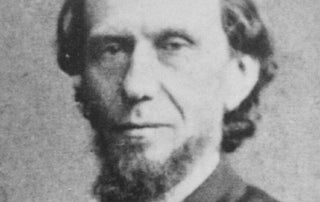Andrew Murray was not only one of the most gifted church leaders in nineteenth-century South Africa but also a writer who continues to inspire Christians across the world today.
Murray’s father was a Scottish Presbyterian missionary who went to South Africa to be a pastor in the Dutch Reformed Church. It was a denomination that served the Afrikaners; people who had originally been settlers from Holland.
Andrew was born in 1828 and was sent to Scotland at the age of ten to be educated. Academically successful, Murray decided to return to South Africa to be a pastor. However, in the course of theological training he realised that his faith was superficial and gave his life to Christ in what he considered his conversion.
Aged twenty-one, Murray was appointed as a church minister in a vast, remote part of South Africa. The country was not an easy place for Christian ministry, with communities divided bitterly by race, politics and theology. In over sixty years of ministry in South Africa, one of Murray’s greatest achievements was how he became respected and trusted across these divisions.
Murray, dedicated to his ministry of teaching and preaching, worked with such energy and commitment that his congregation assumed that he would burn himself out. He was, however, helped by his marriage in 1856 to Emma, the daughter of an English Anglican minister. Emma proved to be an outstanding support, helping with his ministry, editing his publications, maintaining hospitality for visitors and giving birth to numerous children, eight of whom were to survive to adulthood.
In his first years as pastor, Murray found himself in a spiritual desert. Part of the problem was the theologically correct but often lifeless theology of his denomination and also its use of a formal Dutch language which his Afrikaans-speaking congregation struggled with. However, in 1860 revival broke out in Murray’s church and community. There was praying, repentance, conversions and a sense of awe in overflowing meetings. Murray, brought up in a world of ‘quiet religion’, was initially troubled by the exuberance but soon recognised that what was happening was of God. The revival spread across South Africa and beyond its borders.
Early in his ministry, Murray began writing books both in Dutch and English. It was the start of an extraordinary ministry in which he wrote 250 books and leaflets. Murray – who was able to dictate several chapters a day – wrote for ordinary believers everywhere with the goal of deepening their spiritual life and encouraging mission. Some of his books, such as Abide in Christ, Absolute Surrender and With Christ in the School of Prayer, are still read and considered devotional classics. Through his books Murray’s influence began to grow worldwide.
In 1879 Murray’s voice, strained by years of preaching, forced him to stop preaching and to concentrate on praying and writing. Two years later, his voice was restored through a ministry of prayer, and ever afterwards Murray expected divine healing. The time ‘laid aside’ as a preacher seems to have had the benefit of deepening and refining Murray as a man and as a minister.
Murray returned not just to pastoring but also evangelistic and conference speaking in South Africa, Europe and the United States. He became closely involved with the Keswick Movement and wrote books on the need for holiness and the power of the Holy Spirit.
Murray was not only a preacher and speaker but also a man of action. He founded schools, started mission societies and helped set up a theological seminary. Increasingly, he was acknowledged as a church leader across South Africa and someone who could organise initiatives and chair committees.
With the new century Murray gradually stepped back from pastoring. His beloved Emma died in 1905 and Murray himself died in 1917 at the age of eighty-eight.
Disappointing, however, was the future of the Dutch Reformed Church which was to adopt a nationalist theology – now thankfully abandoned – which justified the separation of the races in apartheid. It was a position that Murray, who worked closely with everyone of every race, would have utterly condemned.
Andrew Murray was a man who served God well in many roles. His fruitfulness was due to his deep devotional life, something that I think was revealed in three areas.
First, Murray’s devotional life gave him authority in his preaching. When people heard Murray preach, they were aware that this was a man who had been with God and whose words carried something of God’s own power. There was a prophetic quality to him.
Second, his devotional life gave Murray authenticity in his writing. Andrew Murray is not speaking of second-hand experiences; he is speaking from personal experience.
Andrew Murray wrote: ‘Being filled with the Spirit is simply this – having my whole nature yielded to His power. When the whole soul is yielded to the Holy Spirit, God Himself will fill it.’ Andrew Murray’s life was one that was completely yielded to God.
Finally, his devotional life gave Murray ability in his leading. One of the fascinating things about Andrew Murray was his skill as a leader, indeed a statesman. He became a leader in his denomination for decades and served on numerous church and political committees. Here, even Murray’s opponents openly admired his humility, patience, kindness and gentleness, and his ability to forgive. Inevitably, his remarkable relationship with God overflowed through his life and ministry.
Andrew Murray was an extraordinary man from whom we can all learn much. But perhaps the most important lesson to us all is the simplest: his strength and skill came from his personal relationship with the living God.
J.John
Reverend Canon




